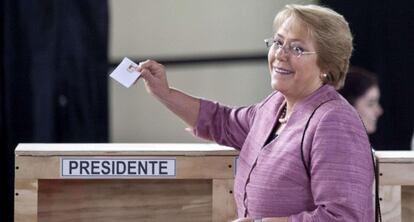Bachelet fails to win in first round of voting in Chile’s presidential race
Former president will face runoff with Piñera’s former labor minister

Despite the favorable poll showings that have given her a comfortable lead over the past few months, former President Michelle Bachelet will face a runoff next month after she failed to get 50 percent of the vote in Sunday’s Chilean presidential race.
The 62-year-old socialist, who is vying for a second term, won 46.48 percent of the vote while her closest rival, Evelyn Matthei, a former labor minister who represents the Alliance conservative bloc, obtained 25.01 percent.
The results came as a surprise for the ruling conservative coalition of outgoing President Sebastián Piñera. Although Bachelet ended with a 21-percent margin, Matthei’s supporters were expecting to lose during the first round of voting after Bachelet far outpolled all her opponents.
Marco Enríquez-Ominami, a former Socialist who represented the PRO movement, placed third in the race with 10.93 percent while businessman Franco Parisi, who ran as an independent, garnered 10.13 percent.
The other five candidates, who represented anti-establishment movements, all obtained less than three percent of the vote.
The second round will be held on December 15. Both Enríquez-Ominami and Parisi have said they won’t offer their support to either candidate. In 2009, when he also placed third, Enríquez-Ominami similarly refused to back the then-center-left candidate Eduardo Frei Ruiz-Tagle, who narrowly lost in the second round to Piñera.
It was important for Bachelet to win on the first round to help solidify support for her planned reforms
Bachelet was confident when she cast her vote early Sunday morning at a school in an east Santiago neighborhood. “We would like to win in the first round because there is so much to do,” said the former president who governed from 2006 to 2010.
But by the afternoon, long faces were appearing among the supporters of her center-left New Majority coalition as they gathered at a local hotel when the first results began trickling in.
An estimated 13 million Chileans were eligible to cast ballots in the country’s first election in which voting was not mandatory, which also featured a new automatic registration system. However, only about six million people actually went to the polls, a lower turnout than expected.
In the past 2009 presidential race, when voting was mandatory, only 56.6 percent of Chileans went to the ballot box.
It was important for Bachelet to win on the first round to help solidify support for her planned reforms, which include the drafting of a new Constitution, changes to the country’s education system, and a restructuring of the tax code.
Bachelet’s center-left coalition took two senatorial and 10 lower chamber districts from the conservative bloc, giving it a majority in both houses of Congress. Nevertheless, it still doesn’t have enough for a majority to pass any reforms without the support of other parties.
Under Chile’s current Constitution, presidents are barred from running for subsequent terms. Until March, Bachelet, a physician and divorced mother, served as the first director of a new agency at the United Nations called UN Women. She resigned to return to Chile to run for reelection.
Tu suscripción se está usando en otro dispositivo
¿Quieres añadir otro usuario a tu suscripción?
Si continúas leyendo en este dispositivo, no se podrá leer en el otro.
FlechaTu suscripción se está usando en otro dispositivo y solo puedes acceder a EL PAÍS desde un dispositivo a la vez.
Si quieres compartir tu cuenta, cambia tu suscripción a la modalidad Premium, así podrás añadir otro usuario. Cada uno accederá con su propia cuenta de email, lo que os permitirá personalizar vuestra experiencia en EL PAÍS.
¿Tienes una suscripción de empresa? Accede aquí para contratar más cuentas.
En el caso de no saber quién está usando tu cuenta, te recomendamos cambiar tu contraseña aquí.
Si decides continuar compartiendo tu cuenta, este mensaje se mostrará en tu dispositivo y en el de la otra persona que está usando tu cuenta de forma indefinida, afectando a tu experiencia de lectura. Puedes consultar aquí los términos y condiciones de la suscripción digital.








































